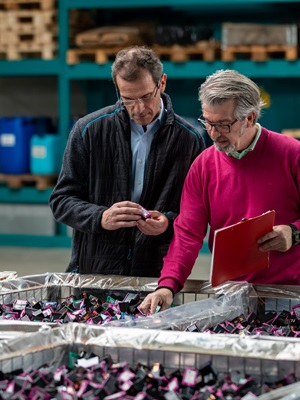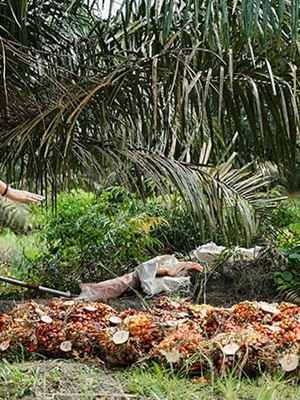Food waste is a significant issue that affects not only the environment but also the sustainability of a city. To shed more light on the global food waste issue, Asia is responsible for 50% of the world's food waste. Highly urbanised areas, specifically China, Japan, and South Korea, account for over a quarter of this total.
Unfortunately, Hong Kong, a bustling metropolis known for its vibrant culinary scene, is also grappling with urgent food waste challenges and is no exception to this global pandemic. In Hong Kong alone, over 3,600 tonnes of food are discarded every day and end up in landfills, constituting nearly one-third of the city's municipal solid waste. What is even more alarming is that Hong Kong only has 2 out of the 16 remaining landfills, and 40% of these landfills are filled with food waste. Additionally, approximately 13 million rice bowls are thrown away daily, equivalent to around 2 rice bowls wasted per person per day. These staggering figures not only dominate valuable landfill space but also contribute to harmful greenhouse gas emissions, directly impacting climate change. Food waste emits methane, a greenhouse gas that is approximately 25 times more potent than carbon dioxide in terms of its heat-trapping capacity. Reducing food waste is, therefore, mandatory for Hong Kong's sustainability and environmental goals.
In this article, we delve into the key factors impacting the environment, Hong Kong's sustainability initiatives, and its food waste policy. We also explore food waste in Hong Kong and suggest potential solutions to mitigate this issue. Finally, we emphasise the necessity of considering the environmental impact when making decisions about our food purchases, dining out, and consumption behaviour.
Food Waste Initiatives in Hong Kong
Recognising the urgency of this issue, Hong Kong has initiated several sustainability projects and campaigns to tackle food waste. One notable initiative is the "Food Wise Hong Kong" campaign launched by the Environmental Protection Department. This campaign aims to raise public awareness about food waste, promotes the adoption of responsible consumption habits, and encourages the food industry to implement measures that reduce waste generation.
Additionally, the government is implementing legislation to promote food waste reduction. The "Mandatory Food Waste Charging" scheme requires designated premises, such as restaurants, hotels, and shopping centres, to pay a fee based on the amount of food waste they generate. This economic incentive encourages businesses to implement strategies to minimise food waste, such as improving inventory management, donating excess food to charities, or composting organic waste.
These policy initiatives are commendable, but the question remains: are they enough? We leave this answer up to you. Moreover, a concerted effort between policymakers and civilians is paramount to actively make Hong Kong a more sustainable city. So, how can we all be part of the solution?
Food Waste Solutions in Hong Kong
To effectively combat food waste, a multifaceted approach is necessary. Several organisations and NGOs in Hong Kong are actively involved in redistributing surplus food to those in need. These initiatives help bridge the gap between food surplus and food insecurity. Collaborations between businesses, charities, and government bodies are crucial in establishing effective channels for food donation and redistribution.
mindful of portion sizes and taking leftovers home, we can help minimise food waste when eating out in restaurants.
Education and public awareness are critical in driving long-term behaviour change. Schools, community centres, and media outlets can actively promote the importance of reducing food waste through educational programs, workshops, and awareness campaigns. By instilling valuable sustainable practices early on, future generations can contribute to a more sustainable and food waste-conscious society.
How does CHOMP fit in?
After highlighting the food waste problem in Hong Kong, let's discuss the birth of CHOMP. CHOMP is an award-winning food-saving app designed to change the way people feel about food consumption and encourage sustainable living in Hong Kong. The app was founded by Carla Martinesi who grew up in a mixed Italian-Hong Kong household, in Switzerland and was surrounded by nature constantly. She always had a strong belief in protecting the environment and ensuring a sustainable future for generations to come. After moving back to Hong Kong to reconnect to her roots Through CHOMP, she is determined to make a difference in the world by addressing one of the most critical global issues: food waste.
CHOMP provides F&B businesses with the opportunity to reduce their waste and generate additional revenue from what they would otherwise throw away. Our efforts have garnered recognition from various media outlets, including Forbes, SCMP, NowTV, Ming Pao, and Tatler, further spreading awareness about the importance of reducing food waste. CHOMP is committed to supporting local businesses while championing the cause of food waste reduction. We firmly believe that by collaborating with our extensive network of F&B partners and engaging customers in the fight against food waste, we can all make a tangible impact on our planet's sustainability.
To date, we have partnered with over 150 vendors, including renowned brands like Maxim’s, Shangri-La, Flash Coffee, and more. Our goal is to partner with vendors that deal with F&B across multiple sectors, involving the hospitality industry and potentially the aviation industry as well. With over 20,000 app downloads, we have successfully rescued more than 8,000 boxes of food and saved an average of 16,000 kg of CO2 emissions. Lastly, we believe in the importance of education and spreading awareness. Our business model focuses on providing useful tips and guidance on how to be more sustainable and adopt a zero-waste food mentality. Make sure to check out our website for more information!
Conclusion
Food waste poses significant challenges to Hong Kong's environment, sustainability initiatives, and overall well-being. However, with concerted efforts from government bodies, businesses, NGOs, and individuals, it is possible to effectively address this issue. By implementing sustainable practices, supporting food redistribution initiatives, promoting education, and being mindful consumers, we can collectively reduce food waste, conserve resources, and build a more
Posted 21/02/2024

















